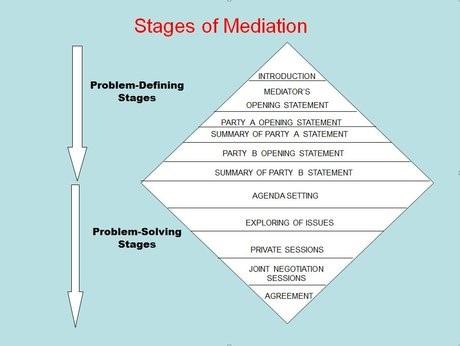Business Mediation
Is mediation the new way forward when it comes to resolving business conflicts?

Author: DBS BusinessClass, Administrator of DBS
In a dynamic business environment, conflicts arising from miscommunications between parties such as customers, vendors, suppliers and staff are inevitable. Mediation seeks to bridge this gap by bringing clarity and objectivity to a complex situation –in the hope of helping parties on all sides find common ground and forge a mutually beneficial solution.
DBS Business Class was present at Mediation for the Business Community, an event shared by BusinessClass Member Nafisah Zakariah on Friday, 24 April 2015, and jointly organized by the Singapore Mediation Centre (SMC) and the Singapore International Mediation Centre (SIMC).
The event began with a role-play demonstration that introduced the audience to a 9-stage process of business mediation –as shown in the diagram below.

Credit: Singapore Mediation Centre
In a dynamic business environment, conflicts arising from miscommunications between parties such as customers, vendors, suppliers and staff are inevitable. Mediation seeks to bridge this gap by bringing clarity and objectivity to a complex situation –in hopes of helping the parties involved find common ground and forge a mutually beneficial solution.
Unlike going to court, a mediator, who may be a respected lawyer or industry figure, facilitates the process by identifying issues, exploring options, and negotiating a constructive settlement that both parties can agree on.
Business mediation is the most rapid growing approach for resolving business disputes. Businesses of all sizes are constantly working to develop conflict resolution approaches that can help reduce the usage of arbitration.
Why Mediation?
Firstly, most who have undergone mediation report high levels of satisfaction as it provides a private and confidential environment to explore options without generating negative publicity.
Secondly, the parties involved often possess significant control over the mediation process and the end product –in contrast to the risks and uncertainties of arbitration.
Thirdly, the extraordinary flexibility of a mediation arrangement allows the mediation process to be tailored towards meeting the needs of all parties and critically addressing the issues at hand.
Solutions that might otherwise not have been found if the case had been brought to court can be brought to light. The range of options to facilitate the negotiations is limited only by the willingness of participants, the creativity of mediators and the parties themselves.
While business mediation has always been an available option, it is certainly gaining momentum. With mediation centers like SMC & SIMC establishing their provision of services, more businesses should consider turning to this fluid form of consensual approach.
Credits to:
Massachusetts Dispute Resolution Services: Mediating Business Disputes - http://www.mdrs.com/faqs/mdrs-articles/mediating-business-disputes
Was this information useful?
Thanks for your feedback
Subscribe to DBS BusinessClass
Stay updated with the latest market trends and industry insights, connect with a network of entrepreneurs, and gain access to exclusive event invitations. Join Asia's fastest growing business community – get your complimentary membership here.





That's great to hear. Anything you'd like to add?
We're sorry to hear that. How can we do better?